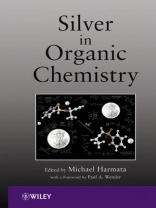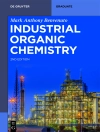The first authoritative book on using silver cations in organic
chemistry–for catalysis and more!
With more sophisticated catalytic methodologies fueling a
resurgence in the study of cation-based chemistry, gold and
platinum have stepped to the fore as the unique agents used to
create new chemical reactions. Although these metals have become a
primary focus of researchers in the field, another coinage metal
that is often overlooked–but is as powerful as the
others–is silver, a far less costly alternative to gold and
platinum in aiding the development of new reactions.
Making a strong case for the use of silver as a catalyst and
structural element in organometal constructs, this authoritative
book is the first to explore the benefits of using silver in
organic chemistry by taking a close look at silver’s unique
reactivity and structural characteristics for the development of
new methods and materials. Silver in Organic Chemistry
is:
* The first book to address catalysis using silver, whose use in
organic chemistry is on the verge of exploding
* A resource for researchers wishing to do chemistry with silver
cations, an area that stands in the shadow of gold chemistry, but
still glistens, demonstrating that all that glitters is not
gold–sometimes it’s silver!
* A guide for ‘first attempts’ in working with silver
cations
* Edited by a very well-respected, highly visible authority in
this field
Silver in Organic Chemistry promotes further scientific
discussion by offering important new ways to examine the future
possibilities of an emerging field. By elevating the importance of
silver chemistry, this thought-provoking guide illustrates how this
versatile metal can become an increasingly significant player in
opening the door to new catalytic organic reactions and new
organometal materials.
Over de auteur
MICHAEL HARMATA holds the academic position of Norman Rabjohn Distinguished Professor of Chemistry at the University of Missouri-Columbia. He has published extensively in his field and has been chair of the Gordon Research Conference on Organic Reactions and Processes (2000) and has served as an invited speaker at many U.S. and international universities and conferences, including the International Symposium on Molecular Recognition and Inclusion, the International Congress on Heterocyclic Chemistry, and the International IUPAC Conference on Organic Synthesis. Dr. Harmata has also served on the editorial board of Mini-Reviews in Organic Chemistry and Chemtracts Organic Chemistry. He is the Editor of Elsevier’s book series, Strategies and Tactics in Organic Synthesis, and editor of Springer’s Organic Mechanisms.












